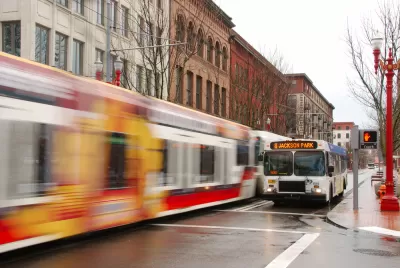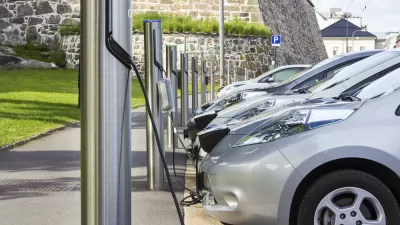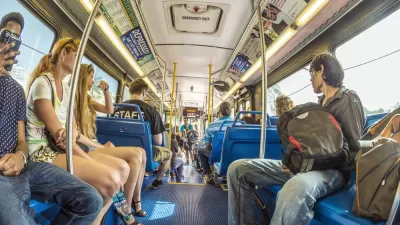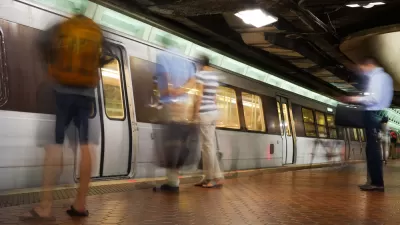The federal government can encourage public transit use and electrification through reforms in transportation systems and land use policies.

As climate change intensifies, writes Kevin DeGood, "[t]he United States must adopt policies and make investments to achieve net-zero GHG emissions by midcentury." Two important steps: "electrifying vehicles and reducing the automobile dependence of communities," which includes "[r]apid electrification of transportation powered by renewable energy."
"In addition to electrification, the federal government needs to substantially reform its transportation policies to reduce auto dependence by directing funds to projects that expand transportation choice—including transit, biking, and walking—and encourage infill development," says DeGood. "Climate change cannot be addressed without reforming land use, and land use cannot be changed without reforming transportation."
The design of transportation systems "has important implications for not only driving and mobile emissions but also the economic productivity of those facilities and the long-term cost burden associated with maintenance." DeGood compares Ohio and Washington, D.C.'s systems: "every lane mile of roadway in Washington, D.C., supports, on average, 4 1/2 times as many residents as in Ohio. … Stated differently, every dollar spent on building and maintaining the roadway network in Washington is providing a larger economic return on investment than the equivalent dollar spent in Ohio." Yet "83 percent of Ohio adults drive to work alone, while only 4 percent take transit, bike, or walk. In Washington, only 34 percent of residents drive alone, while 53 percent take transit, bike, or walk."
"Congress is currently debating the reauthorization of federal highway, transit, and passenger rail programs. The U.S. House of Representatives has passed the INVEST Act, which contains several key policy reforms to address climate change and improve overall system performance." The act, writes DeGood, could be "a strong step in a new direction, pushing states and regions to make different, more sustainable, and more productive investments with federal dollars."
FULL STORY: To Tackle Climate Change, We Must Reform Land Use

Alabama: Trump Terminates Settlements for Black Communities Harmed By Raw Sewage
Trump deemed the landmark civil rights agreement “illegal DEI and environmental justice policy.”

Study: Maui’s Plan to Convert Vacation Rentals to Long-Term Housing Could Cause Nearly $1 Billion Economic Loss
The plan would reduce visitor accommodation by 25% resulting in 1,900 jobs lost.

Why Should We Subsidize Public Transportation?
Many public transit agencies face financial stress due to rising costs, declining fare revenue, and declining subsidies. Transit advocates must provide a strong business case for increasing public transit funding.

Wind Energy on the Rise Despite Federal Policy Reversal
The Trump administration is revoking federal support for renewable energy, but demand for new projects continues unabated.

Passengers Flock to Caltrain After Electrification
The new electric trains are running faster and more reliably, leading to strong ridership growth on the Bay Area rail system.

Texas Churches Rally Behind ‘Yes in God’s Back Yard’ Legislation
Religious leaders want the state to reduce zoning regulations to streamline leasing church-owned land to housing developers.
Urban Design for Planners 1: Software Tools
This six-course series explores essential urban design concepts using open source software and equips planners with the tools they need to participate fully in the urban design process.
Planning for Universal Design
Learn the tools for implementing Universal Design in planning regulations.
Caltrans
Smith Gee Studio
Institute for Housing and Urban Development Studies (IHS)
City of Grandview
Harvard GSD Executive Education
Toledo-Lucas County Plan Commissions
Salt Lake City
NYU Wagner Graduate School of Public Service





























